-
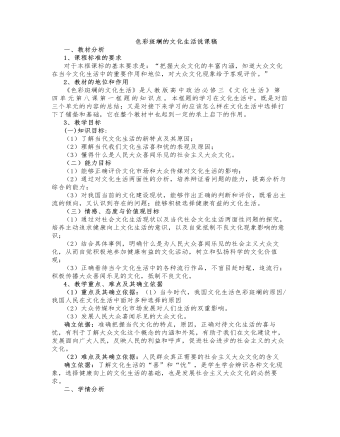
人教版高中政治必修3色彩斑斓的文化生活说课稿
五、板书设计第一节色彩斑斓的文化生活一.当代文化生活素描(现状、原因)1、现状(1)文化生产:色彩斑斓(2)文化消费:多种选择2、当代文化生活色彩斑斓的原因有哪些?/当代人们在文化生活中为什么会面对多种选择?(1)现代科学技术(2)大众传媒(3)社会主义市场经济的发展(4)现代文化产业的发展二.文化生活中的“喜”与“忧”1、喜(1)表现①它能满足人们日趋多样化的文化需求,充实人们的精神生活②它可以通过灵活而有吸引力的表现方式,传播科学文化知识③它便于采取群众喜闻乐见的方式,使人们潜移默化地接受正确的价值观念,提高思想道德素质④它易于引导人们的消费观念,推动生产的发展(2)原因:文化市场和大众传媒的发展2、忧(1)表现①有些部门和单位在经济利益的驱动下,不顾社会效益,肆意生产、销售品位低下的文化产品
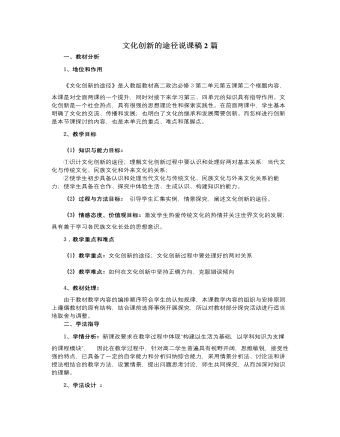
人教版高中政治必修3文化创新的途径说课稿2篇
PPT:文化创新的途径环节二:(展示情境 探究问题)情境一:先后展示徐悲鸿的《奔马图》和《愚公移山》设计意图:在作品的选择上遵循由易到难,由感性到理性的原则让同学们从中体会作者的创作情怀,比较两幅图表达的心境不同之处及其原因。探究一:从创作背景的不同,探究文化创新的根本途径。PPT:(设问)1、为什么同一画家在不同时期,作品所反映的内容不同?2、从中我们可看出,文化创新的根本途径是什么?设计意图:引导学生分析时代的变化对人们的社会实践的影响,因而文化工作者在体验生活的过程中创作的作品意境也会不同,培养学生透过现象看本质的能力,得出文化创新的根本途径是社会实践。教师过渡:在社会实践中,徐悲鸿先生还有什么创作的成功秘诀吗?探究二:从创作心得的展示,探究文化创新的重要途径(PPT)徐悲鸿一生致力于国画的创新实践,他认为革新中国绘画的要旨在于:“古法之佳者,守之;不佳者,改之;垂绝者,继之;未足者,增之;西方画之可采入者,融之。” 设计意图:通过阅读材料,培养学生寻找关键词的能力,并从中总结归纳文化创新的重要途径----继承传统、推陈出新。
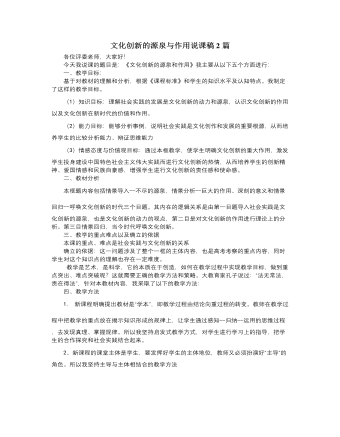
人教版高中政治必修3文化创新的源泉与作用说课稿2篇
一、教学目标:基于对教材的理解和分析,根据《课程标准》和学生的知识水平及认知特点。我制定了这样的教学目标。(1)知识目标:理解社会实践的发展是文化创新的动力和源泉,认识文化创新的作用以及文化创新在新时代的价值和作用。(2)能力目标:能够分析事例,说明社会实践是文化创作和发展的重要根源,从而培养学生的比较分析能力、辩证思维能力(3)情感态度与价值观目标:通过本框教学,使学生明确文化创新的重大作用,激发学生投身建设中国特色社会主义伟大实践而进行文化创新的热情,从而培养学生的创新精神、爱国情感和民族自豪感,增强学生进行文化创新的责任感和使命感。二、教材分析本框题内容包括情景导入--不尽的源泉,情景分析--巨大的作用、深刻的意义和情景回归--呼唤文化创新的时代三个目题。其内在的逻辑关系是由第一目题导入社会实践是文化创新的源泉,也是文化创新的动力的观点,第二目是对文化创新的作用进行理论上的分析。第三目情景回归,当今时代呼唤文化创新。
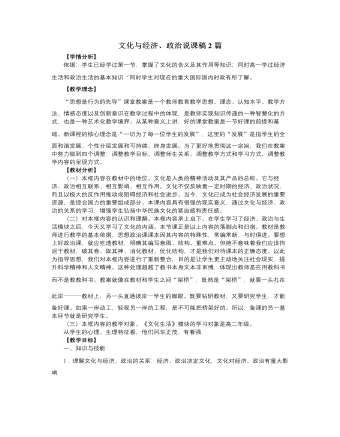
人教版高中政治必修3文化与经济、政治说课稿2篇
2、文化反作用经济政治师:经济政治决定文化,那么,文化不是被动消极的呢?生:思考回答:文化反作用经济政治,不同的文化对经济政治的影响不同。师:文化反作用经济政治,对社会发展有重要影响。文化反作用表现在,文化可以为经济政治的发展,对社会的发展,提供方向保证、智力支持和精神动力。(1)文化反作用的体现。师:现代民主国家中,世界民主的先驱是英国,但英国却有国王,亚洲民主的先驱是日本,但日本却有天皇,其一个重要原因是文化的影响。这说明什么?生:思考发言……师:不同民族的文化,影响不同民族和国家的历史和发展道路。师:中东地区一直以来都是世界热点地区,如巴以冲突、伊拉克战争、阿富汗战争、基地组织等,其一个重要原因是宗教文化的冲突。这说明什么?生:思考发言……师:不同文化的冲突,影响社会的和谐安定和世界的和平安宁。
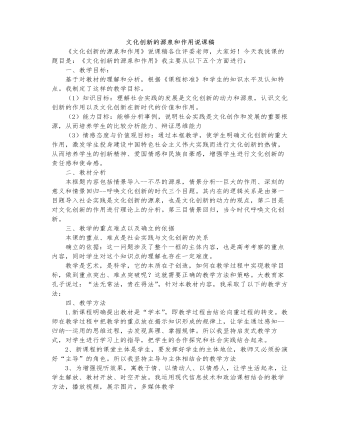
人教版高中政治必修3文化创新的源泉和作用说课稿
二、巨大的作用,深刻地意义材料展示:鲁迅在《狂人日记》中猛烈抨击“吃人”的封建礼教,力图通过自己的呐喊唤醒民众。高尔基早期的作品多描绘俄国沙皇制度下人民的痛苦和他们对美好生活的憧憬。20世纪初,俄国革命形势的发展使他讲文学的笔锋转向革命,创作了《母亲》等作品。合作探究:鲁迅和高尔基的作品在当时的中国和俄国分别起到了什么作用?列举喜爱的一些文学和艺术作品,说说创作者的意图是什么?引导学生自主阅读,培养自主学习能力,掌握分析归纳法和团结协作精神。学生回答之后师生共同总结:文化创新来源于社会实践,同也会对于社会实践产生新的影响,促进社会实践的变化,同时也繁荣了民族文化。所以文化创新的巨大作用一方面表现为推动社会实践的发展,另一方面表现为不断促进民族文化的繁荣。既然文化创新具有如此巨大的作用,那么作为新时代祖国的建设者为了繁荣民族文化,又该作些什么呢?进入本课第三目和教学的第三个环节。[情景回归参与生活]
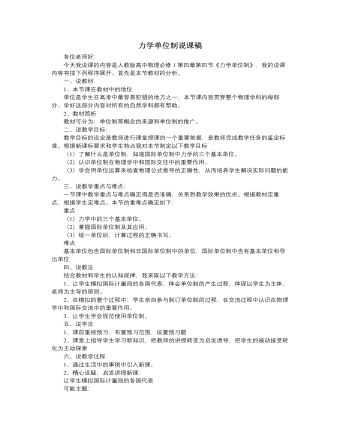
人教版新课标高中物理必修1力学单位制说课稿
今天我说课的内容是人教版高中物理必修1第四章第四节《力学单位制》,我的说课内容将按下列程序展开。首先是本节教材的分析。一、说教材1、本节课在教材中的地位单位是学生在高考中最容易犯错的地方之一,本节课内容贯穿整个物理学科的每部分。学好这部分内容对所有的自然学科都有帮助。2、教材简析教材可分为:单位制等概念的来源和单位制的推广。二、说教学目标:教学目标的设定是教师进行课堂授课的一个重要依据,是教师完成教学任务的鉴定标准。根据新课标要求和学生特点我对本节制定以下教学目标(1)了解什么是单位制,知道国际单位制中力学的三个基本单位。(2)认识单位制在物理学中和国际交往中的重要作用。(3)学会用单位运算来检查物理公式推导的正确性,从而培养学生解决实际问题的能力。

人教版高中历史必修3物理学的重大进展说课稿2篇
二、相对论的创立【课件】展示下列材料艾伯特·爱因斯坦(1879——1955),1879年3月14日诞生在德国乌尔姆的一个犹太人家中。1894年举家迁居意大利米兰。1900年毕业于瑞士苏黎世工业大学。爱因斯坦被认为是最富于创造力的科学家,他不但创立了相对论,还提出了光量子的概念,得出了光电效应的基本定律,并揭示了光的波粒二重性本质,为量子力学的建立奠定基础。为此荣获1921年度的诺贝尔物理学奖。同时,他还证明了热的分子运动论,提出了测定分子大小的新方法。【问题】19世纪末20世纪初爱因斯坦对物理学的贡献是什么?意义是什么?为什么会出现?1、背景:经典物理学的危机。19世纪末三大发现:x射线、放射性和电子,经典力学无法解释研究中的新问题,如:黑体辐射、光电效应等。2、相对论的提出及主要内容:(1)“狭义相对论”和光速不变原理:1905年提出。
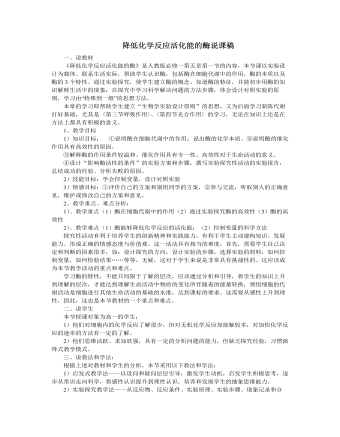
人教版高中生物必修1降低化学反应活化能的酶说课稿
实验是学习生物的手段和基础,是培养学生分析问题、解决问题的能力及创造能力的载体。新课程倡导:强调过程,强调学生探索新知识的经历和获得新知的体验,不能在让教学脱离学生的内心感受,必须让学生追求过程的体验。并且每年高考都有对生物学实验的考查,而且比例越来越重,而学生的失分比例大,主要在于他们没有完整的生物实验设计模式,考虑问题欠缺,本节安排在第二课时完整讲述高中生物学实验设计,是以学生在第一课时和前面探究实验接触的前提下,完整体验生物实验设计模式,为后面学习探究实验打下基础,也为培养学生分析问题、解决问题从一开始就打好基础。五、说教学过程:第一课时联系生活,导入新课,激发学生学习兴趣→细胞代谢→问题探究,酶在代谢中的作用,掌握科学实验方法→酶的本质,运用方法,自主归纳获取新知→小结练习,突出重点易化难点
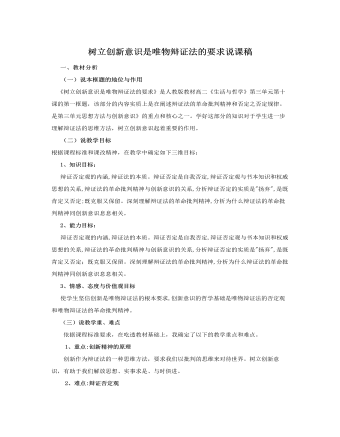
人教版高中政治必修4树立创新意识是唯物辩证法的要求说课稿(二)
一、教材分析(一)说本框题的地位与作用《树立创新意识是唯物辩证法的要求》是人教版教材高二《生活与哲学》第三单元第十课的第一框题,该部分的内容实质上是在阐述辩证法的革命批判精神和否定之否定规律。是第三单元思想方法与创新意识》的重点和核心之一。学好这部分的知识对于学生进一步理解辩证法的思维方法,树立创新意识起着重要的作用。(二)说教学目标根据课程标准和课改精神,在教学中确定如下三维目标:1、知识目标:辩证否定观的内涵,辩证法的本质。辩证否定是自我否定,辩证否定观与书本知识和权威思想的关系,辩证法的革命批判精神与创新意识的关系,分析辩证否定的实质是"扬弃",是既肯定又否定;既克服又保留。深刻理解辩证法的革命批判精神,分析为什么辩证法的革命批判精神同创新意识息息相关。
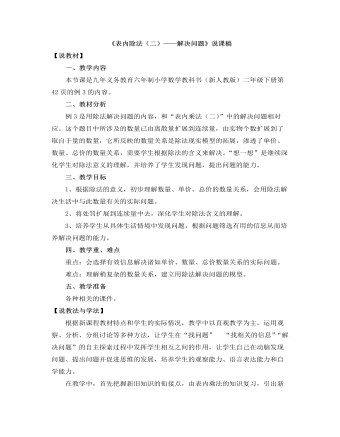
小学数学人教版二年级下册《表内除法(二)——解决问题》说课稿
一、教学内容本节课是九年义务教育六年制小学数学教科书(新人教版)二年级下册第42页的例3的内容。二、教材分析例3是用除法解决问题的内容,和“表内乘法(二)”中的解决问题相对应。这个题目中所涉及的数量已由离散量扩展到连续量,由实物个数扩展到了取自于量的数量,它所反映的数量关系是除法现实模型的拓展,渗透了单价、数量、总价的数量关系,需要学生根据除法的含义来解决。“想一想”是继续深化学生对除法意义的理解,并培养了学生发现问题,提出问题的能力。三、教学目标1、根据除法的意义,初步理解数量、单价、总价的数量关系,会用除法解决生活中与此数量有关的实际问题。2、将处罚扩展到连续量中去,深化学生对除法含义的理解。3、培养学生从具体生活情境中发现问题,根据问题筛选有用的信息从而培养解决问题的能力。
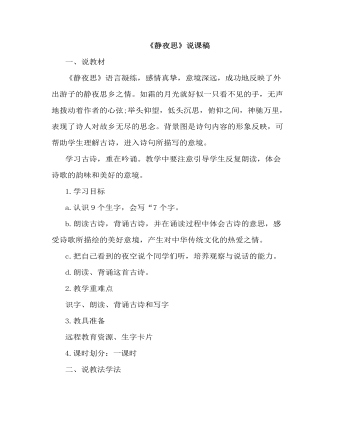
部编人教版一年级下册《静夜思》(说课稿)
为了使学生能在视、听、说、思等几个环节中经历学习的过程,体验学习语文的乐趣,顺利达成教学目标,我设计的教学过程如下:1.观察交流、激发兴趣、情景导入为了能让学生更好的体会静夜,我设计了这一环节。在上新课前一晚,布置学生去观察夜晚的天空,然后上课时把自己观察到夜空的内容和感受,说给同学听,大家互相交流下。交流后引入新课:静夜思。课题引入后,给学生解释下课题,让学生思考一下,诗人是在什么时候思念,又思念些什么?提问后,把远程教育碟片切到《静夜思》这课,让学生欣赏课文。2.初读古诗,整体感知,认读生字我设计这一环节,是想让学生通过自己朗读课文,去发现这课的生字,并在这环节中,要求学生利用拼音帮助自己读准每个字,尤其是一些后鼻音,让学生成为学习的主人。
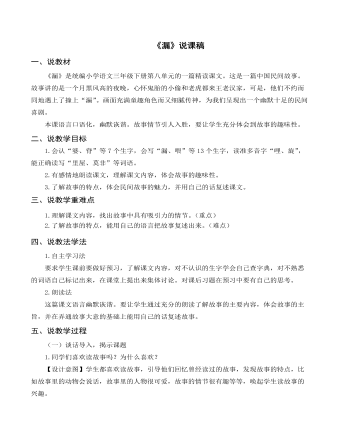
(说课稿)部编人教版三年级下册《漏》
二、说教学目标 1.会认“婆、脊”等7个生字,会写“漏、喂”等13个生字,读准多音字“哩、旋”,能正确读写“里屋、莫非”等词语。2.有感情地朗读课文,理解课文内容,体会故事的趣味性。3.了解故事的特点,体会民间故事的魅力,并用自己的话复述课文。三、说教学重难点1.理解课文内容,找出故事中具有吸引力的情节。(重点)2.了解故事的特点,能用自己的语言把故事复述出来。(难点)四、说教法学法1.自主学习法 要求学生课前要做好预习,了解课文内容,对不认识的生字学会自己查字典,对不熟悉的词语自己标记出来,在课堂上提出来集体讨论。对课后习题在预习中要有自己的思考。 2.朗读法 这篇课文语言幽默诙谐。要让学生通过充分的朗读了解故事的主要内容,体会故事的主旨,并在弄通故事大意的基础上能用自己的话复述故事。
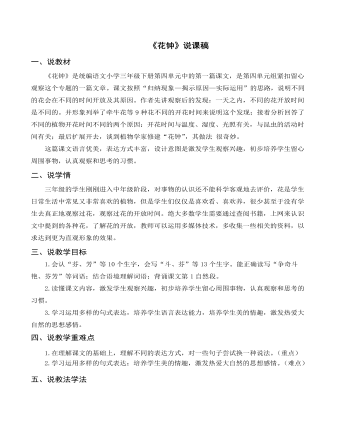
(说课稿)部编人教版三年级下册《 花钟》
三、说教学目标1.会认“芬、芳”等10个生字,会写“斗、芬”等13个生字。能正确读写“争奇斗艳、芬芳”等词语;结合语境理解词语;背诵课文第1自然段。2.读懂课文内容,激发学生观察兴趣,初步培养学生留心周围事物,认真观察和思考的习惯。3.学习运用多样的句式表达,培养学生语言表达能力,培养学生美的情趣,激发热爱大自然的思想感情。四、说教学重难点1.在理解课文的基础上,理解不同的表达方式,对一些句子尝试换一种说法。(重点)2.学习运用多样的句式表达;培养学生美的情趣,激发热爱大自然的思想感情。(难点)五、说教法学法[说教法]通过自主、合作、探究的体验性小组合作学习方式,读中感悟、读中体验,采用“激趣——发现——感悟——实践”的思路,引导学生在自主中学习本文。
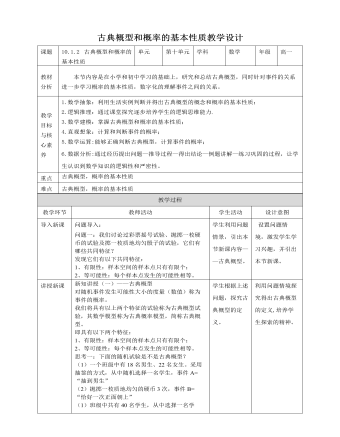
人教A版高中数学必修二古典概型和概率的基本性质教学设计
新知讲授(一)——古典概型 对随机事件发生可能性大小的度量(数值)称为事件的概率。我们将具有以上两个特征的试验称为古典概型试验,其数学模型称为古典概率模型,简称古典概型。即具有以下两个特征:1、有限性:样本空间的样本点只有有限个;2、等可能性:每个样本点发生的可能性相等。思考一:下面的随机试验是不是古典概型?(1)一个班级中有18名男生、22名女生。采用抽签的方式,从中随机选择一名学生,事件A=“抽到男生”(2)抛掷一枚质地均匀的硬币3次,事件B=“恰好一次正面朝上”(1)班级中共有40名学生,从中选择一名学生,即样本点是有限个;因为是随机选取的,所以选到每个学生的可能性都相等,因此这是一个古典概型。
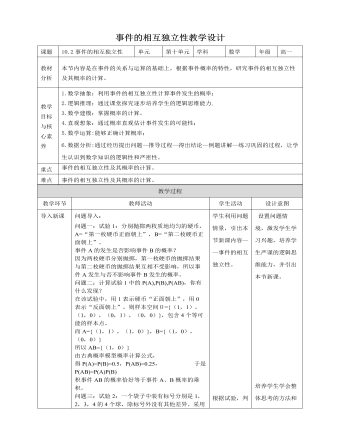
人教A版高中数学必修二事件的相互独立性教学设计
问题导入:问题一:试验1:分别抛掷两枚质地均匀的硬币,A=“第一枚硬币正面朝上”,B=“第二枚硬币正面朝上”。事件A的发生是否影响事件B的概率?因为两枚硬币分别抛掷,第一枚硬币的抛掷结果与第二枚硬币的抛掷结果互相不受影响,所以事件A发生与否不影响事件B发生的概率。问题二:计算试验1中的P(A),P(B),P(AB),你有什么发现?在该试验中,用1表示硬币“正面朝上”,用0表示“反面朝上”,则样本空间Ω={(1,1),(1,0),(0,1),(0,0)},包含4个等可能的样本点。而A={(1,1),(1,0)},B={(1,0),(0,0)}所以AB={(1,0)}由古典概率模型概率计算公式,得P(A)=P(B)=0.5,P(AB)=0.25, 于是 P(AB)=P(A)P(B)积事件AB的概率恰好等于事件A、B概率的乘积。问题三:试验2:一个袋子中装有标号分别是1,2,3,4的4个球,除标号外没有其他差异。

新人教版高中英语必修3Unit 4 Space Exploration-Listening&Speaking&Talking教学设计二
The themes of this part are “Talk about how to become an astronaut” and “Talk about life in space”. As Neil Armstrong said “Mystery creates wonder and wonder is the basis of man’s desire to understand. Space is difficult for human to reach, therefore, humans are full of wonders about it. However, if wanting to achieve the dream of reaching the Moon, some of our human should work hard to be an astronaut at first. Part A(Talk about how to become an astronaut) is a radio interview in a radio studio, where the host asked the Chinese astronauts about his story how to become an astronaut. Yang Liwei told his dreamed to be an astronaut since childhood. Then he worked hard to get into college at 22. The next 10 years, he gradually became an experienced pilot. At the same time, to be an astronaut, he had to study hard English, science and astronomy and trained hard to keep in good physical and mental health and to practise using space equipment. Part B (Talk about life in space) is also an interview with the astronaut Brown, who is back on the earth. The host Max asked about his space life, such as his emotion about going back the earth, the eating, shower, brushing, hobbies and his work. Part A and Part B are interviews. So expressing curiosity about the guests’ past life is a communicative skill, which students should be guided to learn.1. Students can get detailed information about how Yang Liwei became an astronaut and Max’s space life.2. Students learn to proper listening strategy to get detailed information---listening for numbers and taking notes.3. Students can learn related sentences or phrases to express their curiosity like “ I wish to know...” “I’d love to know...”4. Students can learn more about the space and astronauts, even be interested in working hard to be an astronaut

新人教版高中英语必修3Unit 4 Space Exploration-Reading and Thinking教学设计二
The theme of this unit focuses on “space exploration.” Students will learn about the training and experience needed to become an astronaut. The text is mainly about the development of space exploration. On the one hand, the text helps students to have a good understanding about the great feats humans have achieved, on the other hand, they will further understand the contributions that we Chinese have achieved, and feel confident and proud about our homeland and strengthen their love for our country. The teacher should instruct students to aim high and study harder to make great progress in the space career if possible.1. Read about the development and value of space exploration.2. Explore the mysteries of the universe and the achievements in space exploration.3. Skillfully use the vocabulary of this text to cultivate self-study ability 4. Develop cooperative learning ability through discussion.1. Enable the Ss to talk about the development and value of space exploration.2. Guide the Ss to summarize the main idea of each paragraph as well as the main idea of the text.3. Help Ss comprehend the main reasons for space exploration. Multi-media, textbook, notebooks.Step 1: Warming up and predictionLook at the title and the pictures of the text and predict what the text will be about?2. What are the main reasons for space exploration?

新人教版高中英语必修3Unit 1 Festivals and Celebrations-Reading for writing教学设计二
Step 3 Analyzing article structureActivity 31. Teachers raise questions to guide students to analyze the chapter structure of this diary and think about how to describe the festival experience. (1)What should be included in the opening/body/closing paragraph(s)?(2)How did the writer arrange his/her ideas?(3)What kind of interesting details did the writer describe?(4)How did the writer describe his/her feelings/emotions during the event?2. Students read and compare the three sentence patterns in activity 2. Try to rewrite the first paragraph of the diary with these three sentence patterns. After that, students exchange corrections with their partners. Such as:●This was my first time spending three days experiencing the Naadam Festival in China’s Inner Mongolia Autonomous Region and it was an enjoyable and exciting experience. ●I'll never forget my experience at the Naadam Festival because it was my first time to watch the exciting Mongolian games of horse racing, wrestling, and archery so closely. ●I'll always remember my first experience at the Naadam Festival in China’s Inner Mongolia Autonomous Region because it was so amazing to spend three days witnessing a grand Mongolian ceremony. Step 4 Accumulation of statementsActivity 41. Ask the students to read the diary again. Look for sentences that express feelings and emotions, especially those with the -ing form and the past participle. Such as:● …horse racing, wrestling, and archery, which are all so exciting to watch. ● some amazing performances● I was surprised to see…● I was a little worried about. . . ● feeling really tiredOther emotional statements:●I absolutely enjoyed the archery, too, but the horse races were my favourite part. ●I'm finally back home now, feeling really tired, but celebrating Naadam with my friend was totally worth it. ●He invited me back for the winter to stay in a traditional Mongolian tent and cat hot pot. I can’t wait!2. In addition to the use of the -ing form and the past participle, the teacher should guide the students in the appreciation of these statements, ask them to memorize them, and encourage them to use them reasonably in writing practice.

新人教版高中英语必修3Unit 4 Space Exploration-Reading for Writing教学设计二
⑦在我看来, 探索太空是值得的。As far as I am concerned, it is worthwhile to explore the space.Step 10 Writing---draftRecently, students in our class have had heated a discussion on whether space is worth exploring. Students hold different ideas about it.30% of us think space exploration is not worthwhile. They think space is too far away from us and our daily life and is a waste of money. And the money spent on space exploration can be used to solve the earth’s problems such as starvation and pollution.On the other hand,70% think space is worth exploring because we have benefited a lot from it,such as using satellites for communication and weather forecast. What’s more,with further space research,we may solve the population problem by moving to other planets one day. Also,space research will enable us to find new sources to solve the problem of energy shortages on the earth.As far as I am concerned, it is worthwhile to explore the space. Not only can it promote the development of society but also enrich our life. Step 11 Pair workExchange drafts with a partner. Use this checklist to help your partner revise his/her draft.1.Does the writer explain why he/she changed/wanted to change?2.Does the writer tell how the changes have improved or will improve his/her life?3.Is the text well-organised?4.Does the writer use words and expressions to show similarities and differences?5.Are there any grammar or spelling errors?6.Does the writer use correct punctuation?

新人教版高中英语必修3Unit 5 The value of money-Reading and Thinking教学设计二
? Could you offer me some kind of work here?? I don’t want your charity, I just want an honest job.? Careless: I landed in Britain by accident.Step 7:Consolidation.? Find Henry? Roderick and Oliver were I .making a bet when they saw Henry, a poor young man. ? Know Henry? About a month ago, Henry was sailing and later he found himself carried out to sea by a strong wind. Fortunately, he 2.was spotted by a ship. And it was the ship that brought him to 3.England? Offer money to Henry ? Oliver and Roderick gave Henry a letter and told him that there was money in it. They 4.persuaded him to accept it, and made him 5.promise that it wouldn't be opened until 2 o'clock.Step 8:Language pointsa large amount of: a large quantity of; a great deal ofe.g. They bought a large amount of furniture before they moved their new house.make a bet: make an arrangement to risk money, etc. on an event of which the result is doubtful.e.g. We made a bet on the result of the match.permit sb to do something: allow somebody to do somethinge.g. My mother doesn’t permit me to ride in the street after it rained.by accident: as a result of chancee.g. I only found it by accident.stare at: look at somebody or something with the eyes wide open in a fixed gaze( in astonishment, wonder, fear, etc)to be honest: to tell you the truth; to be franke.g. To be honest, I don’t think we have a chance of winning.Step7 Homework:What do you think will happen to Henry? Will the bank-note help him or get him into trouble?